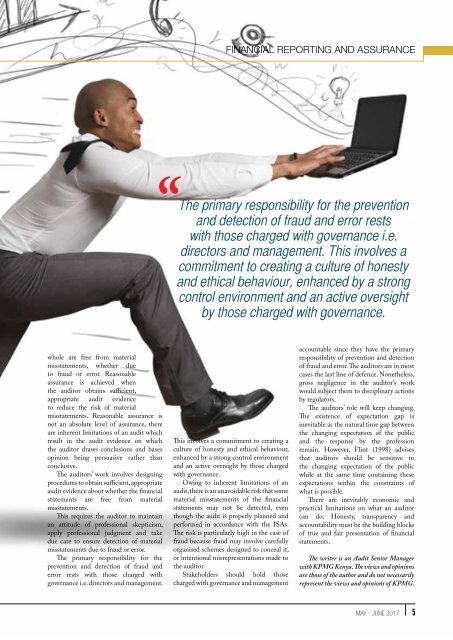The Accountant-May-June 2017
You also want an ePaper? Increase the reach of your titles
YUMPU automatically turns print PDFs into web optimized ePapers that Google loves.
Financial reporting and assurance<br />
<strong>The</strong> primary responsibility for the prevention<br />
and detection of fraud and error rests<br />
with those charged with governance i.e.<br />
directors and management. This involves a<br />
commitment to creating a culture of honesty<br />
and ethical behaviour, enhanced by a strong<br />
control environment and an active oversight<br />
by those charged with governance.<br />
whole are free from material<br />
misstatements, whether due<br />
to fraud or error. Reasonable<br />
assurance is achieved when<br />
the auditor obtains sufficient,<br />
appropriate audit evidence<br />
to reduce the risk of material<br />
misstatements. Reasonable assurance is<br />
not an absolute level of assurance, there<br />
are inherent limitations of an audit which<br />
result in the audit evidence on which<br />
the auditor draws conclusions and bases<br />
opinion being persuasive rather than<br />
conclusive.<br />
<strong>The</strong> auditors’ work involves designing<br />
procedures to obtain sufficient, appropriate<br />
audit evidence about whether the financial<br />
statements are free from material<br />
misstatements.<br />
This requires the auditor to maintain<br />
an attitude of professional skepticism,<br />
apply professional judgment and take<br />
due care to ensure detection of material<br />
misstatements due to fraud or error.<br />
<strong>The</strong> primary responsibility for the<br />
prevention and detection of fraud and<br />
error rests with those charged with<br />
governance i.e. directors and management.<br />
This involves a commitment to creating a<br />
culture of honesty and ethical behaviour,<br />
enhanced by a strong control environment<br />
and an active oversight by those charged<br />
with governance.<br />
Owing to inherent limitations of an<br />
audit, there is an unavoidable risk that some<br />
material misstatements of the financial<br />
statements may not be detected, even<br />
though the audit is properly planned and<br />
performed in accordance with the ISAs.<br />
<strong>The</strong> risk is particularly high in the case of<br />
fraud because fraud may involve carefully<br />
organised schemes designed to conceal it,<br />
or intentional misrepresentations made to<br />
the auditor.<br />
Stakeholders should hold those<br />
charged with governance and management<br />
accountable since they have the primary<br />
responsibility of prevention and detection<br />
of fraud and error. <strong>The</strong> auditors are in most<br />
cases the last line of defence. Nonetheless,<br />
gross negligence in the auditor’s work<br />
would subject them to disciplinary actions<br />
by regulators.<br />
<strong>The</strong> auditors’ role will keep changing.<br />
<strong>The</strong> existence of expectation gap is<br />
inevitable as the natural time gap between<br />
the changing expectation of the public<br />
and the response by the profession<br />
remain. However, Flint (1998) advises<br />
that auditors should be sensitive to<br />
the changing expectation of the public<br />
while at the same time containing these<br />
expectations within the constraints of<br />
what is possible.<br />
<strong>The</strong>re are inevitably economic and<br />
practical limitations on what an auditor<br />
can do. Honesty, transparency and<br />
accountability must be the building blocks<br />
of true and fair presentation of financial<br />
statements.<br />
<strong>The</strong> writer is an Audit Senior Manager<br />
with KPMG Kenya. <strong>The</strong> views and opinions<br />
are those of the author and do not necessarily<br />
represent the views and opinions of KPMG.<br />
MAY - JUNE <strong>2017</strong> 5

















